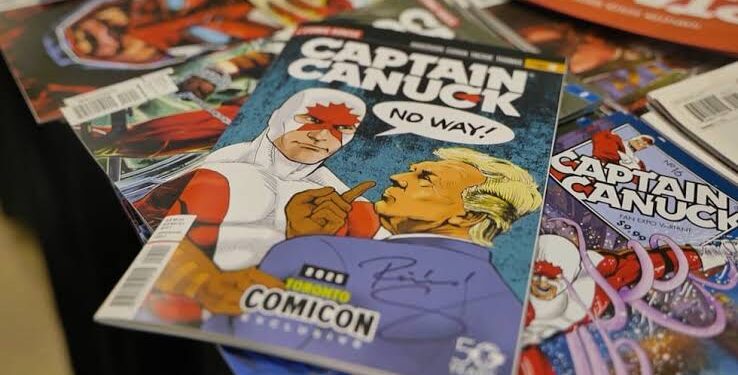A comic book hero from the 1970s is soaring back into the spotlight — not because of aliens or supervillains, but due to escalating political drama between Canada and the US under Donald Trump’s presidency.
Captain Canuck, recognised by his red-and-white costume and commitment to Canadian sovereignty has resurfaced. He is now a cultural emblem against Trump’s aggressive trade policies and suggestions to annex Canada and make it the 51st state of the US.
“It’s got a lot of Canadians, you know, thinking about their identity as Canadians and feeling more united as Canadians. We feel like, okay, we’ve got to stand in opposition to these proposals,” said Richard Comely, the 74-year-old co-creator of the character, in an interview with Reuters.
In a storyline reminiscent of traditional superhero tales, Donald Trump is cast as a supervillain, with Elon Musk playing his steadfast ally — both facing the might of Captain Canuck. One scene portrays the superhero interrupting Trump mid-act, and another shows both Trump and Musk being dragged away, symbolising their defeat at the hands of Canada’s patriotic champion.
Comic takes aim at Trump, Musk amid trade tensions
Comely, who launched Captain Canuck in 1975, noted that recent political developments have stirred a renewed sense of national pride. “All of a sudden Canadians are looking to Captain Canuck as a symbol. And it’s basically, to them, Captain Canuck symbolises independence,” he said.
Captain Canuck was conceived as a distinctly Canadian counterpart to American superheroes like Captain America. His alter ego, Tom Evans, is a Royal Canadian Mounted Police officer who gains superhuman abilities through contact with aliens. His uniform is marked with maple leaves and Canada’s signature red and white colours.
“So in a sense, we have Trump to thank for a bit of resurgence,” Comely remarked, adding that more Canadian businesses have recently shown interest in the character due to rising cross-border political strain.
A new cover for Captain Canuck’s upcoming 50th anniversary edition depicts the hero scolding Trump — a direct response to the US president’s controversial comments about incorporating Canada into the US.
Reflecting on the inspiration behind the character, Comely explained, “I think there was an undercurrent, so to speak, in Canada in the ’70s. So I think Canadians were starting to feel like, you know, like they should acknowledge the fact that we had our own country, and we had our own culture and be proud of the fact that we were Canadians.”
From hiatus to a hero again
Since its inception, the Captain Canuck franchise has distributed over four million comic books, graphic novels, and other publications worldwide. The path hasn’t been straightforward — Comely paused the series to focus on family, before reviving it briefly in the 1990s with the ‘Captain Canuck Reborn’ series.
In 2012, the character was reintroduced to new audiences through a licensing deal with Chapterhouse Comics. This partnership helped modernise the franchise, introducing animated web content and branded products, solidifying Captain Canuck’s role in present-day Canadian culture.
While earlier storylines centred around external forces trying to undermine a strong Canada, Comely said, “Of course, never, never in any of those stories was it America that was going to be taking over Canada.”





























